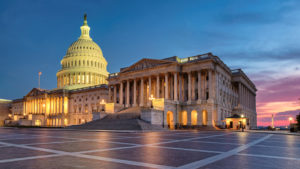
Postmaster suspends controversial changes, Interior Department allows drilling in the Arctic National Wildlife Refuge, and more…
IN THE NEWS
- U.S. Postmaster General Louis DeJoy announced that he would suspend the further implementation of several controversial changes to the postal service, such as shortened retail hours and removal of mail collection boxes, until after the November presidential election “to avoid even the appearance of any impact on election mail.” Dejoy also promised to “engage standby resources” in advance of the election, presumably to ensure that mail-in ballots can be received in time to be counted. Dejoy, however, reportedly told U.S. House of Representatives Speaker Nancy Pelosi (D-Calif.) that he would not reverse any changes already made, such as replacing removed mailboxes. Tensions spiked last month when the U.S. Postal Service notified 46 states and the District of Columbia that their mail-in voting deadlines were incompatible with the Postal Service’s standards for mail processing times.
- The U.S. Department of the Interior announced that up to 1.56 million acres of the Arctic National Wildlife Refuge will be opened for drilling by oil and gas companies. The agency must hold the first auction for oil and gas rights by December 2021, but Interior Secretary David Bernhardt indicated that it could take place as early as the end of this year. Adam Kolton, executive director of the Alaska Wilderness League, published a strong rebuke of the decision in an official statement, likening the move to “Trump’s own Teapot Dome scandal.”
- The U.S. Food and Drug Administration (FDA) granted an emergency use authorization for a saliva-based coronavirus detection test known as SalivaDirect. Developed by a team of researchers at the Yale School of Public Health, SalivaDirect received funding from the National Basketball Association as part of a testing program targeting players and staff. Nathan Grubaugh, assistant professor of epidemiology at Yale School of Medicine, highlighted the scalability of the new saliva-based test, noting that the minimal production costs could result in prices as low as $10 per testing sample. Because the test can be produced using a variety of instruments from multiple vendors, the developers pointed out that the new test may be less vulnerable to the supply chain issues that have plagued other testing strategies in the past.
- The U.S. Department of Health and Human Services and the U.S. Department of Defense announced that McKesson Corporation will serve as a primary distributor of future COVID-19 vaccines. The selection of a vaccine distributor is a key step toward accomplishing the goals of Operation Warp Speed, which aims to deliver 300 million doses of the COVID-19 vaccine by January 2021. The Centers for Disease Control and Prevention (CDC) has reportedly selected California, Florida, Minnesota, North Dakota, and Philadelphia, Pennsylvania to develop pilot plans for transporting, storing, and administering the vaccine that can be used to inform distribution to other parts of the country. CDC Director Robert Redfield reportedly stated that “America’s march toward … safe and effective COVID-19 vaccines is a combined effort between American industry and the federal government.”
- A federal judge temporarily blocked a U.S. Department of Health and Human Services (HHS) rule from going into effect because the judge found that it was contrary to the U.S. Supreme Court’s ruling in Bostock v. Clayton County that sex discrimination includes discrimination based on sexual orientation and gender identity. The HHS rule, which was set to go into effect on August 18, sought to eliminate certain provisions of an Obama Administration rule that defined discrimination “on the basis of sex” to include discrimination based on gender identity. The federal judge stated that, “when the Supreme Court announces a major decision, it seems a sensible thing to pause and reflect on the decision’s impact.”
- The California Air Resources Board reached agreements with Volkswagen, Ford, Honda, Volvo, and BMW, binding them to the state’s fuel efficiency standard. Since the Trump Administration rolled back Obama-era fuel economy rules last summer, the state’s agreements with the automakers hold the companies to standards more rigorous than federal regulations. President Trump criticized the deal as it was being negotiated, and Michael Abboud, a spokesperson for the U.S. Environmental Protection Agency, reportedly called the agreements “a PR stunt.” The agreements solidify the companies’ willingness to adhere to California’s regulations and offer other states the option to adopt the stricter standards, as the terms of the agreement apply beyond California’s borders.
- Top federal health officials reportedly prevented the U.S. Food and Drug Administration from issuing an emergency use authorization for blood plasma as a treatment for COVID-19. President Donald J. Trump and others have praised blood plasma from people who have survived COVID-19 as a potentially powerful treatment for patients. National Institute of Allergy and Infectious Disease doctors Anthony Fauci, Francis Collins, and H. Clifford Lane, however, reportedly expressed concern about approving the treatment without evidence, citing recent studies that have been unable to demonstrate plasma treatment’s efficacy. Although President Trump blamed the delay on political motivations to defer a treatment until after the election, a New York University infectious disease specialist Mila Ortigoza reportedly said that the implications of an emergency approval without adequate testing would “change the way people view trials,” adding that when a treatment becomes available “we want to make sure that when we say it works, we are confident, with indisputable evidence.”
- The U.S. Department of Commerce amended its rules to restrict access to U.S. technology and software by Chinese telecommunications company Huawei Technologies. The latest move in a months-long conflict between the U.S. and Chinese governments, the amendments prohibit non-U.S. companies from selling Huawei foreign-made chips developed using U.S. technology. Commerce Secretary Wilbur Ross stated that Huawei has been working to “fulfill the objectives of the Chinese Communist Party”, making the company a threat to U.S. national security.
- The Mexican state of Tabasco voted to ban the sale of sugar-sweetened beverages and highly processed foods to minors. The ban is part of a larger trend among Mexican states, including Oaxaca, of restricting the sale of unhealthy foods to minors amid evidence that obesity can heighten the risk of serious illness caused by the novel coronavirus. A study found that 73 percent of Mexicans are considered overweight, and 34 percent that are overweight are morbidly obese. The dean of the Friedman School of Nutrition Science and Policy at Tufts University, Dariush Mozaffarian, reportedly said that in Mexico, “we are seeing people at the highest levels talking about the incredible links between lifestyle-related diseases and worse outcomes with COVID-19.” He also worried that the United States lacks the same focus on improving metabolic health and its threat amid the coronavirus pandemic.
WHAT WE’RE READING THIS WEEK
- The U.S. Government Accountability Office (GAO) released a report evaluating how U.S. Immigration and Customs Enforcement (ICE) oversees its facilities and manages detainee complaints. GAO found that most of ICE’s detention facilities received inspections over the course of 2019 but that the agency did not comprehensively analyze the results of these inspections to identify opportunities to improve facility management. The office proffered six recommendations, including that ICE implement a better tracking system to manage data from its facility inspections.
- In a brief for the Urban Institute, Linda Giannarelli and her coauthors assessed how several key provisions of the proposed Health and Economic Recovery Omnibus Emergency Solutions Act (HEROES Act) will affect the number of people living in poverty. Giannarelli and her coauthors projected that the national poverty rate will be three points higher and the poverty rate for households affected by job loss will be six points higher if none of the policies are enacted. Conversely, Giannarelli and her coauthors predicted that the poverty rate will be substantially lower if all of the HEROES Act policies are implemented. Giannarelli and her coauthors cautioned that economic hardship due to the coronavirus pandemic will continue to increase without any additional government support, especially for households in which someone is currently unemployed.
- In a report for the Institute for Justice, Jaimie Cavanaugh and her coauthors conducted a comprehensive survey on state “certificate of need” laws, which serve as government-mandated permissions to start or expand a health care business, service, or facility. Cavanaugh and her coauthors tracked the 39 jurisdictions that continue to use certificates of need and noted the variation in the services that required certificates of need among the states. Cavanaugh and her coauthors found that the lack of uniformity among jurisdictions suggests that the certificates are driven not by an assessment of public need but rather by powerful lobbyists and interest groups within each state. They argued that certificate of need application procedures are costly and time-consuming, issues exacerbated by the added health care demands as a result of COVID-19. They recommended that states repeal certificate-of-need laws to provide better health care options.
FLASHBACK FRIDAY
- In an essay in The Regulatory Review, Gina McCarthy, now the president and CEO of the Natural Resources Defense Council, stressed the need to stop viewing issues of public health and environmental protection as partisan. McCarthy highlighted that, historically, both Democrats and Republicans have understood the importance of protecting the environment and the impact the environment has on public health. McCarthy lamented, however, that the Trump Administration does not see pollution as a threat and has endeavored to remove critical environmental regulations. Despite the lack of federal leadership on environmental regulation, McCarthy noted that many states and cities have stepped up to make their own environmental regulations and urged other subnational governments to do the same.



